Report: Human Activity and its Impact on Global Climate Change
VerifiedAdded on 2020/05/16
|12
|2387
|312
Report
AI Summary
This report examines the contentious issue of human activity's role in global climate change. It identifies key stakeholders, including government agencies, environmental organizations, and scientific bodies, and presents their differing opinions on the subject. The report discusses natural factors affecting climate change, such as solar fluctuations and volcanic eruptions, while emphasizing the significant impact of human actions. It includes a personal reflection on the issue, acknowledging individual responsibility and the need for collective action to mitigate climate change. The report also incorporates feedback analysis, highlighting the improvements made based on peer review, and concludes by emphasizing the urgency of addressing human-induced climate change through conscious daily routines and responsible actions.
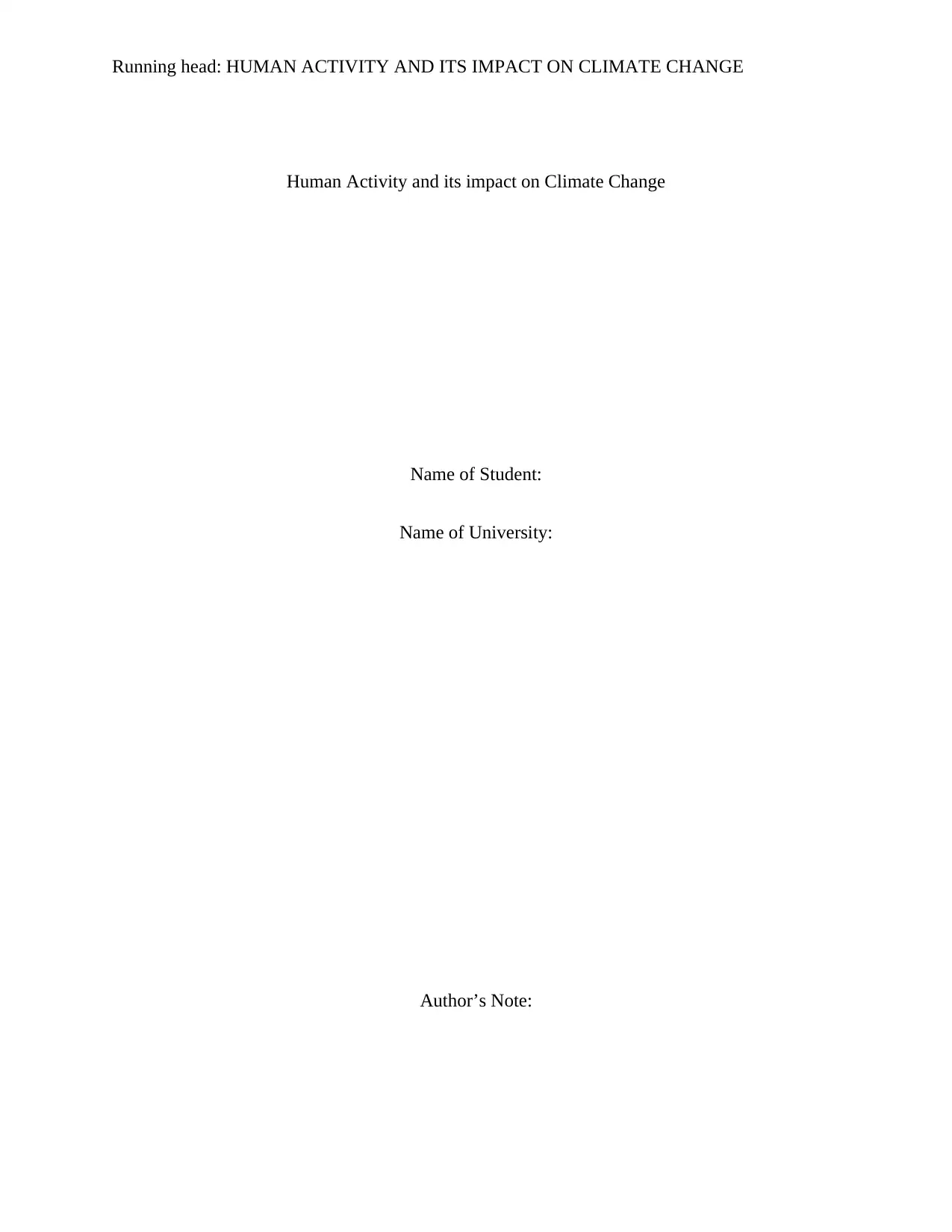
Running head: HUMAN ACTIVITY AND ITS IMPACT ON CLIMATE CHANGE
Human Activity and its impact on Climate Change
Name of Student:
Name of University:
Author’s Note:
Human Activity and its impact on Climate Change
Name of Student:
Name of University:
Author’s Note:
Paraphrase This Document
Need a fresh take? Get an instant paraphrase of this document with our AI Paraphraser
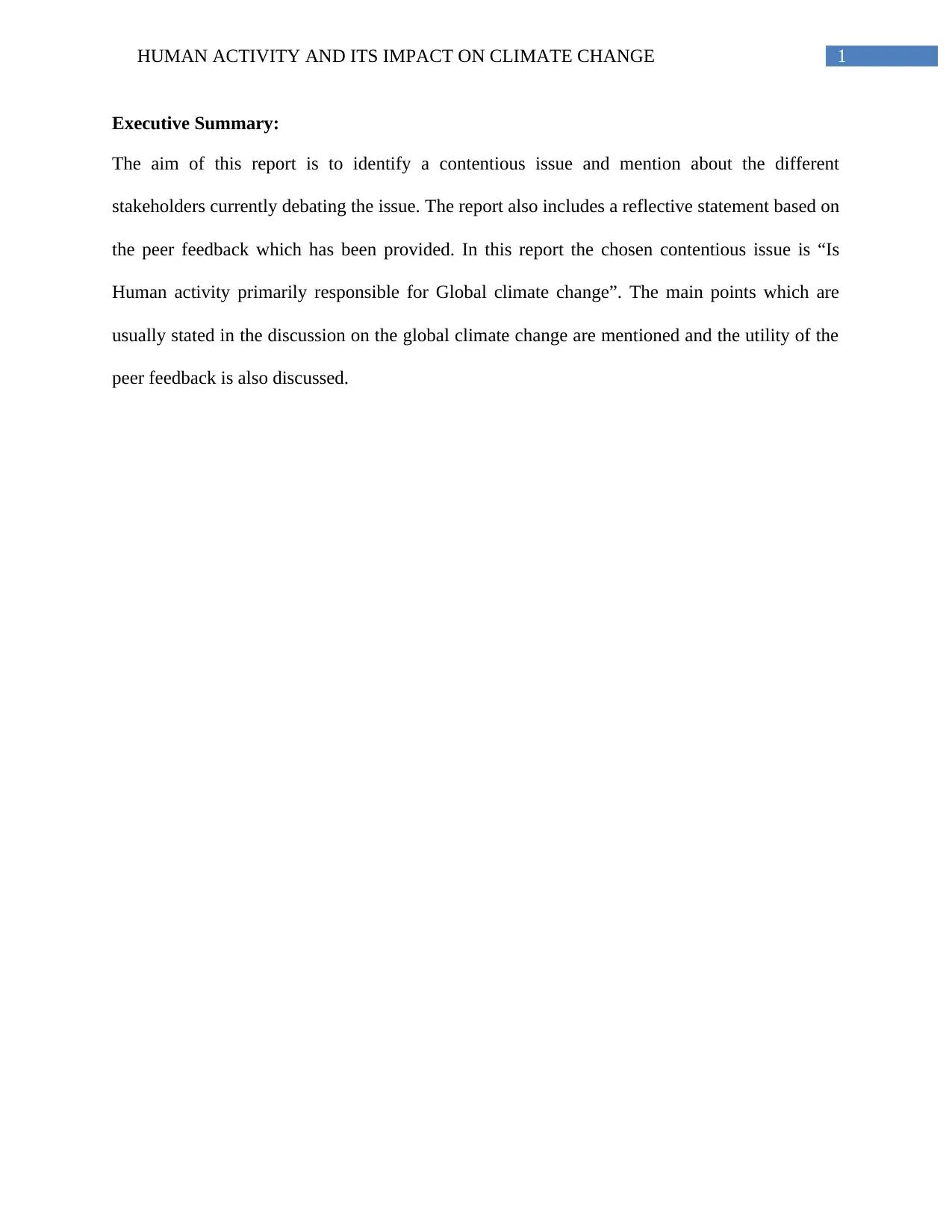
1HUMAN ACTIVITY AND ITS IMPACT ON CLIMATE CHANGE
Executive Summary:
The aim of this report is to identify a contentious issue and mention about the different
stakeholders currently debating the issue. The report also includes a reflective statement based on
the peer feedback which has been provided. In this report the chosen contentious issue is “Is
Human activity primarily responsible for Global climate change”. The main points which are
usually stated in the discussion on the global climate change are mentioned and the utility of the
peer feedback is also discussed.
Executive Summary:
The aim of this report is to identify a contentious issue and mention about the different
stakeholders currently debating the issue. The report also includes a reflective statement based on
the peer feedback which has been provided. In this report the chosen contentious issue is “Is
Human activity primarily responsible for Global climate change”. The main points which are
usually stated in the discussion on the global climate change are mentioned and the utility of the
peer feedback is also discussed.
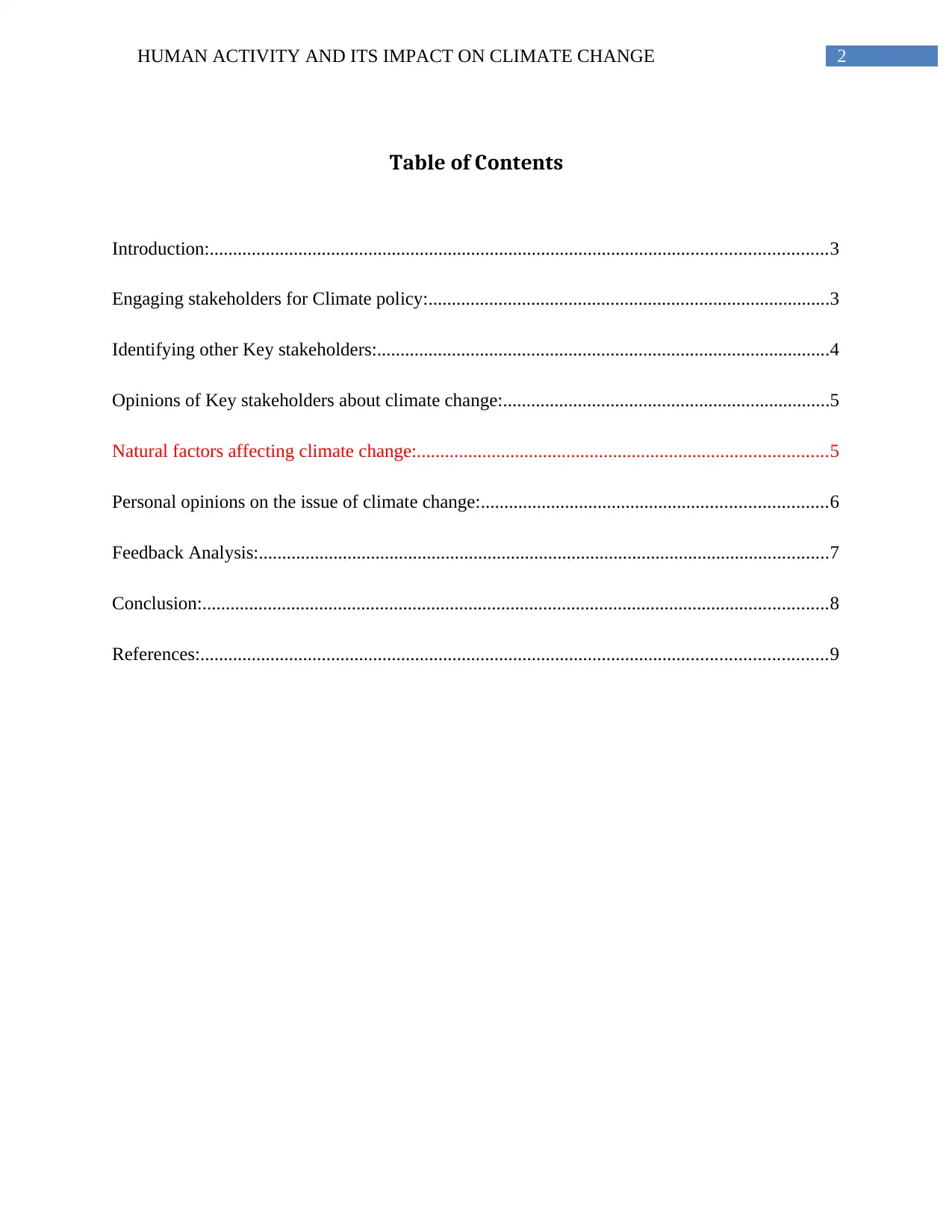
2HUMAN ACTIVITY AND ITS IMPACT ON CLIMATE CHANGE
Table of Contents
Introduction:....................................................................................................................................3
Engaging stakeholders for Climate policy:......................................................................................3
Identifying other Key stakeholders:.................................................................................................4
Opinions of Key stakeholders about climate change:......................................................................5
Natural factors affecting climate change:........................................................................................5
Personal opinions on the issue of climate change:..........................................................................6
Feedback Analysis:..........................................................................................................................7
Conclusion:......................................................................................................................................8
References:......................................................................................................................................9
Table of Contents
Introduction:....................................................................................................................................3
Engaging stakeholders for Climate policy:......................................................................................3
Identifying other Key stakeholders:.................................................................................................4
Opinions of Key stakeholders about climate change:......................................................................5
Natural factors affecting climate change:........................................................................................5
Personal opinions on the issue of climate change:..........................................................................6
Feedback Analysis:..........................................................................................................................7
Conclusion:......................................................................................................................................8
References:......................................................................................................................................9
⊘ This is a preview!⊘
Do you want full access?
Subscribe today to unlock all pages.

Trusted by 1+ million students worldwide
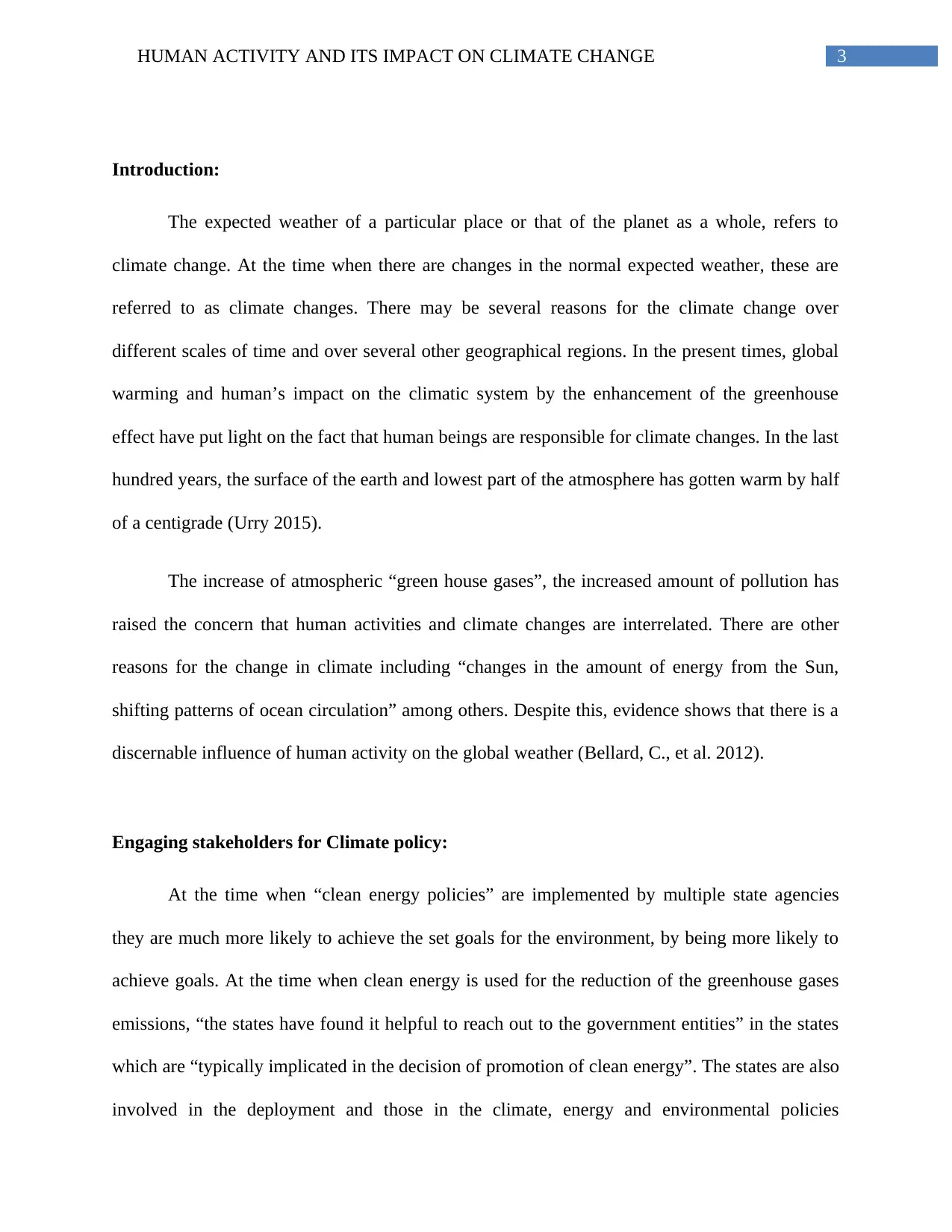
3HUMAN ACTIVITY AND ITS IMPACT ON CLIMATE CHANGE
Introduction:
The expected weather of a particular place or that of the planet as a whole, refers to
climate change. At the time when there are changes in the normal expected weather, these are
referred to as climate changes. There may be several reasons for the climate change over
different scales of time and over several other geographical regions. In the present times, global
warming and human’s impact on the climatic system by the enhancement of the greenhouse
effect have put light on the fact that human beings are responsible for climate changes. In the last
hundred years, the surface of the earth and lowest part of the atmosphere has gotten warm by half
of a centigrade (Urry 2015).
The increase of atmospheric “green house gases”, the increased amount of pollution has
raised the concern that human activities and climate changes are interrelated. There are other
reasons for the change in climate including “changes in the amount of energy from the Sun,
shifting patterns of ocean circulation” among others. Despite this, evidence shows that there is a
discernable influence of human activity on the global weather (Bellard, C., et al. 2012).
Engaging stakeholders for Climate policy:
At the time when “clean energy policies” are implemented by multiple state agencies
they are much more likely to achieve the set goals for the environment, by being more likely to
achieve goals. At the time when clean energy is used for the reduction of the greenhouse gases
emissions, “the states have found it helpful to reach out to the government entities” in the states
which are “typically implicated in the decision of promotion of clean energy”. The states are also
involved in the deployment and those in the climate, energy and environmental policies
Introduction:
The expected weather of a particular place or that of the planet as a whole, refers to
climate change. At the time when there are changes in the normal expected weather, these are
referred to as climate changes. There may be several reasons for the climate change over
different scales of time and over several other geographical regions. In the present times, global
warming and human’s impact on the climatic system by the enhancement of the greenhouse
effect have put light on the fact that human beings are responsible for climate changes. In the last
hundred years, the surface of the earth and lowest part of the atmosphere has gotten warm by half
of a centigrade (Urry 2015).
The increase of atmospheric “green house gases”, the increased amount of pollution has
raised the concern that human activities and climate changes are interrelated. There are other
reasons for the change in climate including “changes in the amount of energy from the Sun,
shifting patterns of ocean circulation” among others. Despite this, evidence shows that there is a
discernable influence of human activity on the global weather (Bellard, C., et al. 2012).
Engaging stakeholders for Climate policy:
At the time when “clean energy policies” are implemented by multiple state agencies
they are much more likely to achieve the set goals for the environment, by being more likely to
achieve goals. At the time when clean energy is used for the reduction of the greenhouse gases
emissions, “the states have found it helpful to reach out to the government entities” in the states
which are “typically implicated in the decision of promotion of clean energy”. The states are also
involved in the deployment and those in the climate, energy and environmental policies
Paraphrase This Document
Need a fresh take? Get an instant paraphrase of this document with our AI Paraphraser
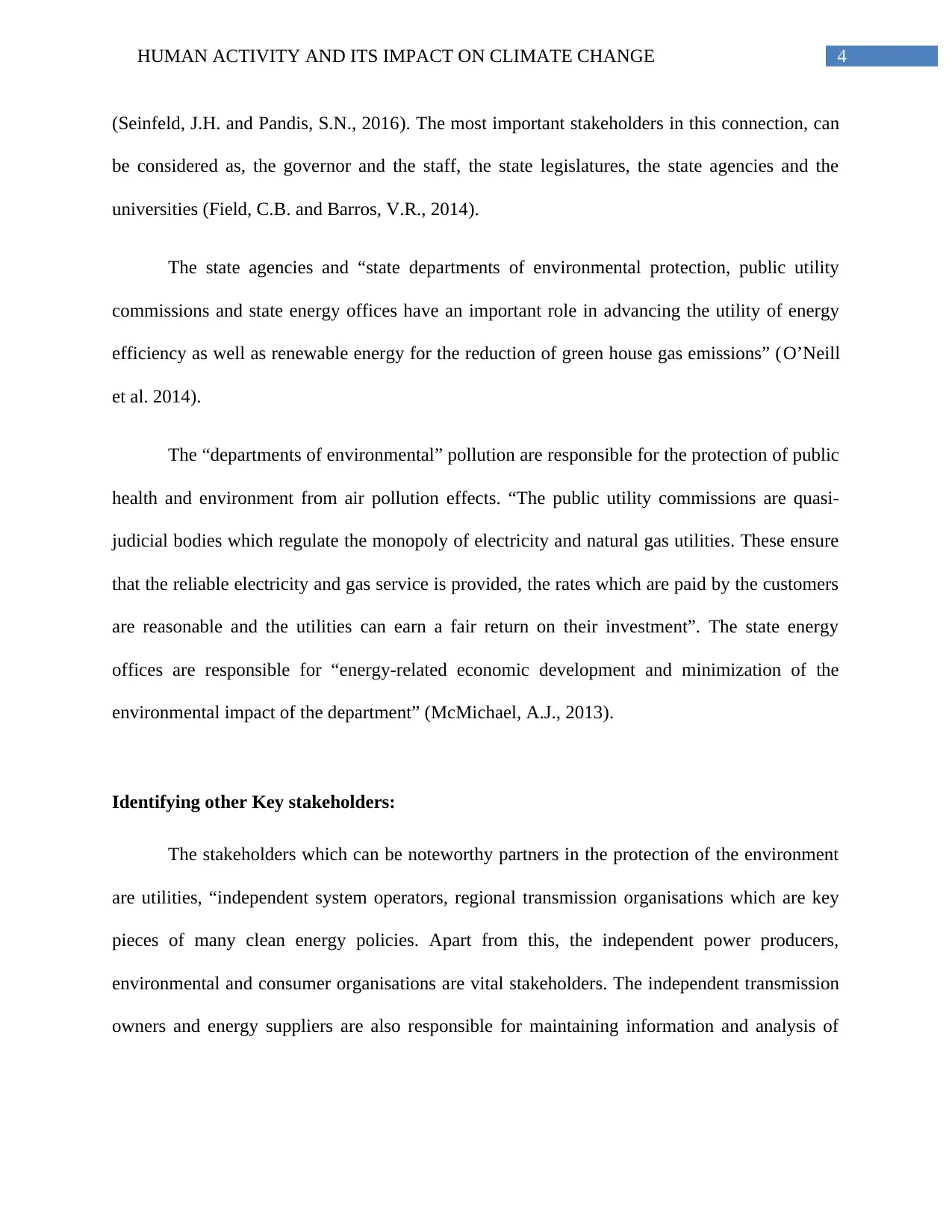
4HUMAN ACTIVITY AND ITS IMPACT ON CLIMATE CHANGE
(Seinfeld, J.H. and Pandis, S.N., 2016). The most important stakeholders in this connection, can
be considered as, the governor and the staff, the state legislatures, the state agencies and the
universities (Field, C.B. and Barros, V.R., 2014).
The state agencies and “state departments of environmental protection, public utility
commissions and state energy offices have an important role in advancing the utility of energy
efficiency as well as renewable energy for the reduction of green house gas emissions” (O’Neill
et al. 2014).
The “departments of environmental” pollution are responsible for the protection of public
health and environment from air pollution effects. “The public utility commissions are quasi-
judicial bodies which regulate the monopoly of electricity and natural gas utilities. These ensure
that the reliable electricity and gas service is provided, the rates which are paid by the customers
are reasonable and the utilities can earn a fair return on their investment”. The state energy
offices are responsible for “energy-related economic development and minimization of the
environmental impact of the department” (McMichael, A.J., 2013).
Identifying other Key stakeholders:
The stakeholders which can be noteworthy partners in the protection of the environment
are utilities, “independent system operators, regional transmission organisations which are key
pieces of many clean energy policies. Apart from this, the independent power producers,
environmental and consumer organisations are vital stakeholders. The independent transmission
owners and energy suppliers are also responsible for maintaining information and analysis of
(Seinfeld, J.H. and Pandis, S.N., 2016). The most important stakeholders in this connection, can
be considered as, the governor and the staff, the state legislatures, the state agencies and the
universities (Field, C.B. and Barros, V.R., 2014).
The state agencies and “state departments of environmental protection, public utility
commissions and state energy offices have an important role in advancing the utility of energy
efficiency as well as renewable energy for the reduction of green house gas emissions” (O’Neill
et al. 2014).
The “departments of environmental” pollution are responsible for the protection of public
health and environment from air pollution effects. “The public utility commissions are quasi-
judicial bodies which regulate the monopoly of electricity and natural gas utilities. These ensure
that the reliable electricity and gas service is provided, the rates which are paid by the customers
are reasonable and the utilities can earn a fair return on their investment”. The state energy
offices are responsible for “energy-related economic development and minimization of the
environmental impact of the department” (McMichael, A.J., 2013).
Identifying other Key stakeholders:
The stakeholders which can be noteworthy partners in the protection of the environment
are utilities, “independent system operators, regional transmission organisations which are key
pieces of many clean energy policies. Apart from this, the independent power producers,
environmental and consumer organisations are vital stakeholders. The independent transmission
owners and energy suppliers are also responsible for maintaining information and analysis of
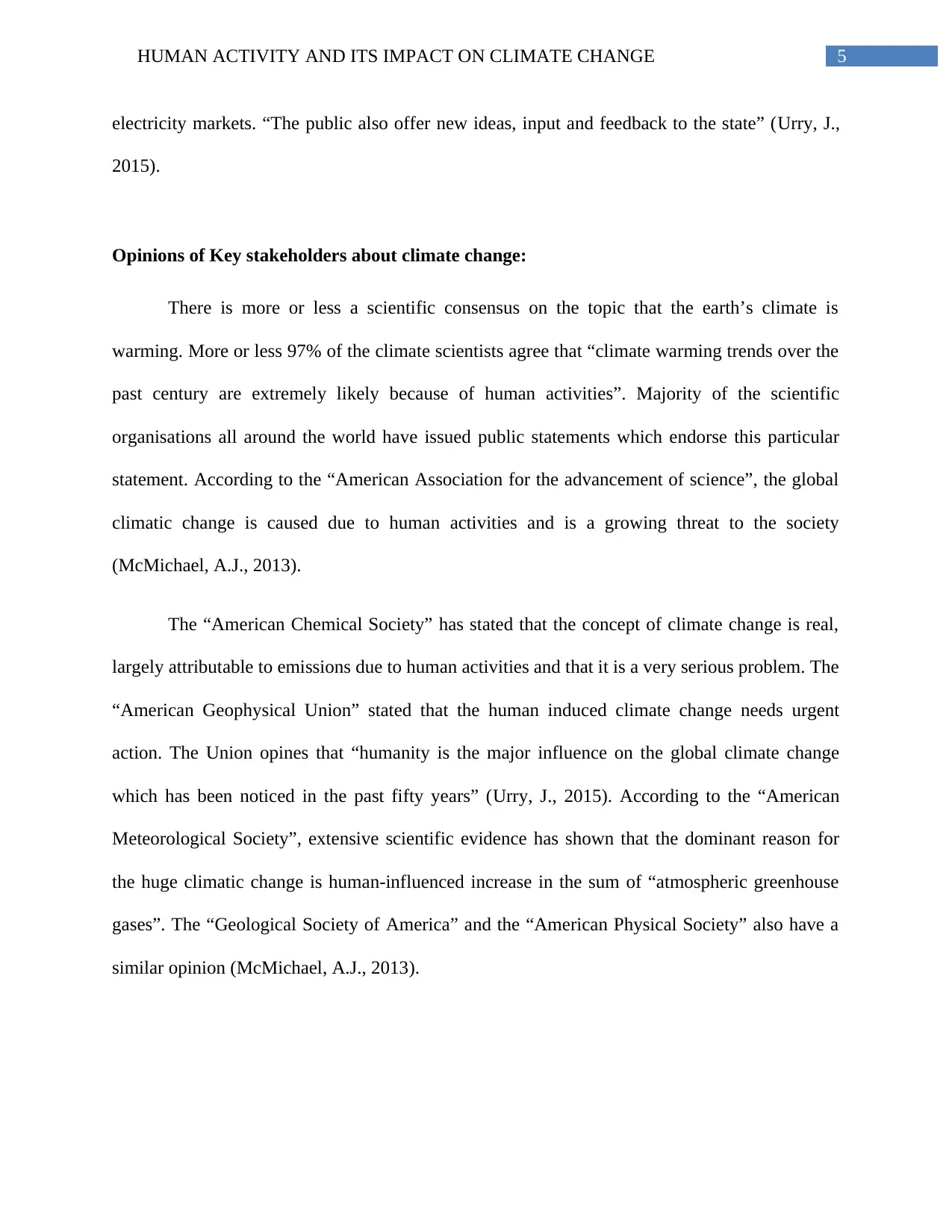
5HUMAN ACTIVITY AND ITS IMPACT ON CLIMATE CHANGE
electricity markets. “The public also offer new ideas, input and feedback to the state” (Urry, J.,
2015).
Opinions of Key stakeholders about climate change:
There is more or less a scientific consensus on the topic that the earth’s climate is
warming. More or less 97% of the climate scientists agree that “climate warming trends over the
past century are extremely likely because of human activities”. Majority of the scientific
organisations all around the world have issued public statements which endorse this particular
statement. According to the “American Association for the advancement of science”, the global
climatic change is caused due to human activities and is a growing threat to the society
(McMichael, A.J., 2013).
The “American Chemical Society” has stated that the concept of climate change is real,
largely attributable to emissions due to human activities and that it is a very serious problem. The
“American Geophysical Union” stated that the human induced climate change needs urgent
action. The Union opines that “humanity is the major influence on the global climate change
which has been noticed in the past fifty years” (Urry, J., 2015). According to the “American
Meteorological Society”, extensive scientific evidence has shown that the dominant reason for
the huge climatic change is human-influenced increase in the sum of “atmospheric greenhouse
gases”. The “Geological Society of America” and the “American Physical Society” also have a
similar opinion (McMichael, A.J., 2013).
electricity markets. “The public also offer new ideas, input and feedback to the state” (Urry, J.,
2015).
Opinions of Key stakeholders about climate change:
There is more or less a scientific consensus on the topic that the earth’s climate is
warming. More or less 97% of the climate scientists agree that “climate warming trends over the
past century are extremely likely because of human activities”. Majority of the scientific
organisations all around the world have issued public statements which endorse this particular
statement. According to the “American Association for the advancement of science”, the global
climatic change is caused due to human activities and is a growing threat to the society
(McMichael, A.J., 2013).
The “American Chemical Society” has stated that the concept of climate change is real,
largely attributable to emissions due to human activities and that it is a very serious problem. The
“American Geophysical Union” stated that the human induced climate change needs urgent
action. The Union opines that “humanity is the major influence on the global climate change
which has been noticed in the past fifty years” (Urry, J., 2015). According to the “American
Meteorological Society”, extensive scientific evidence has shown that the dominant reason for
the huge climatic change is human-influenced increase in the sum of “atmospheric greenhouse
gases”. The “Geological Society of America” and the “American Physical Society” also have a
similar opinion (McMichael, A.J., 2013).
⊘ This is a preview!⊘
Do you want full access?
Subscribe today to unlock all pages.

Trusted by 1+ million students worldwide
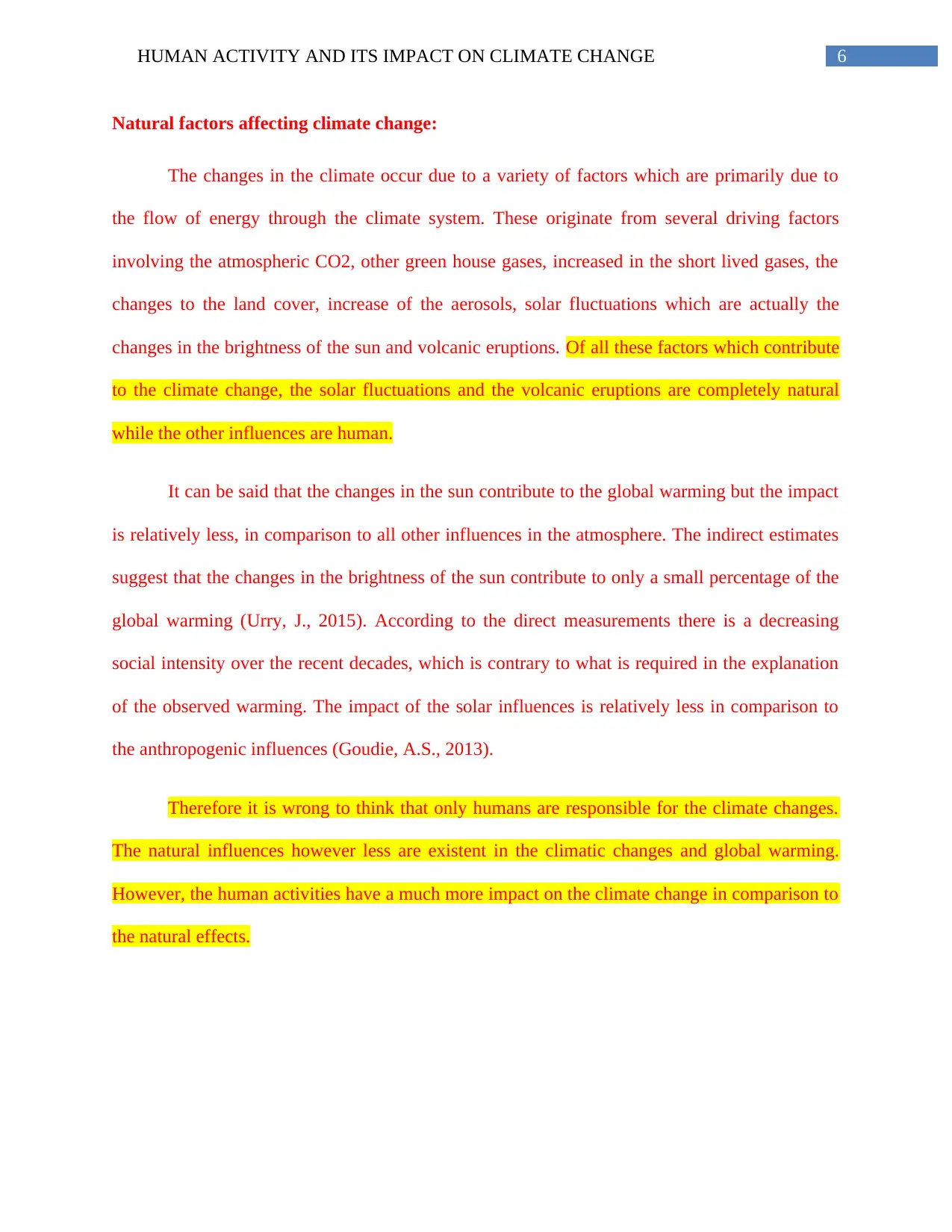
6HUMAN ACTIVITY AND ITS IMPACT ON CLIMATE CHANGE
Natural factors affecting climate change:
The changes in the climate occur due to a variety of factors which are primarily due to
the flow of energy through the climate system. These originate from several driving factors
involving the atmospheric CO2, other green house gases, increased in the short lived gases, the
changes to the land cover, increase of the aerosols, solar fluctuations which are actually the
changes in the brightness of the sun and volcanic eruptions. Of all these factors which contribute
to the climate change, the solar fluctuations and the volcanic eruptions are completely natural
while the other influences are human.
It can be said that the changes in the sun contribute to the global warming but the impact
is relatively less, in comparison to all other influences in the atmosphere. The indirect estimates
suggest that the changes in the brightness of the sun contribute to only a small percentage of the
global warming (Urry, J., 2015). According to the direct measurements there is a decreasing
social intensity over the recent decades, which is contrary to what is required in the explanation
of the observed warming. The impact of the solar influences is relatively less in comparison to
the anthropogenic influences (Goudie, A.S., 2013).
Therefore it is wrong to think that only humans are responsible for the climate changes.
The natural influences however less are existent in the climatic changes and global warming.
However, the human activities have a much more impact on the climate change in comparison to
the natural effects.
Natural factors affecting climate change:
The changes in the climate occur due to a variety of factors which are primarily due to
the flow of energy through the climate system. These originate from several driving factors
involving the atmospheric CO2, other green house gases, increased in the short lived gases, the
changes to the land cover, increase of the aerosols, solar fluctuations which are actually the
changes in the brightness of the sun and volcanic eruptions. Of all these factors which contribute
to the climate change, the solar fluctuations and the volcanic eruptions are completely natural
while the other influences are human.
It can be said that the changes in the sun contribute to the global warming but the impact
is relatively less, in comparison to all other influences in the atmosphere. The indirect estimates
suggest that the changes in the brightness of the sun contribute to only a small percentage of the
global warming (Urry, J., 2015). According to the direct measurements there is a decreasing
social intensity over the recent decades, which is contrary to what is required in the explanation
of the observed warming. The impact of the solar influences is relatively less in comparison to
the anthropogenic influences (Goudie, A.S., 2013).
Therefore it is wrong to think that only humans are responsible for the climate changes.
The natural influences however less are existent in the climatic changes and global warming.
However, the human activities have a much more impact on the climate change in comparison to
the natural effects.
Paraphrase This Document
Need a fresh take? Get an instant paraphrase of this document with our AI Paraphraser
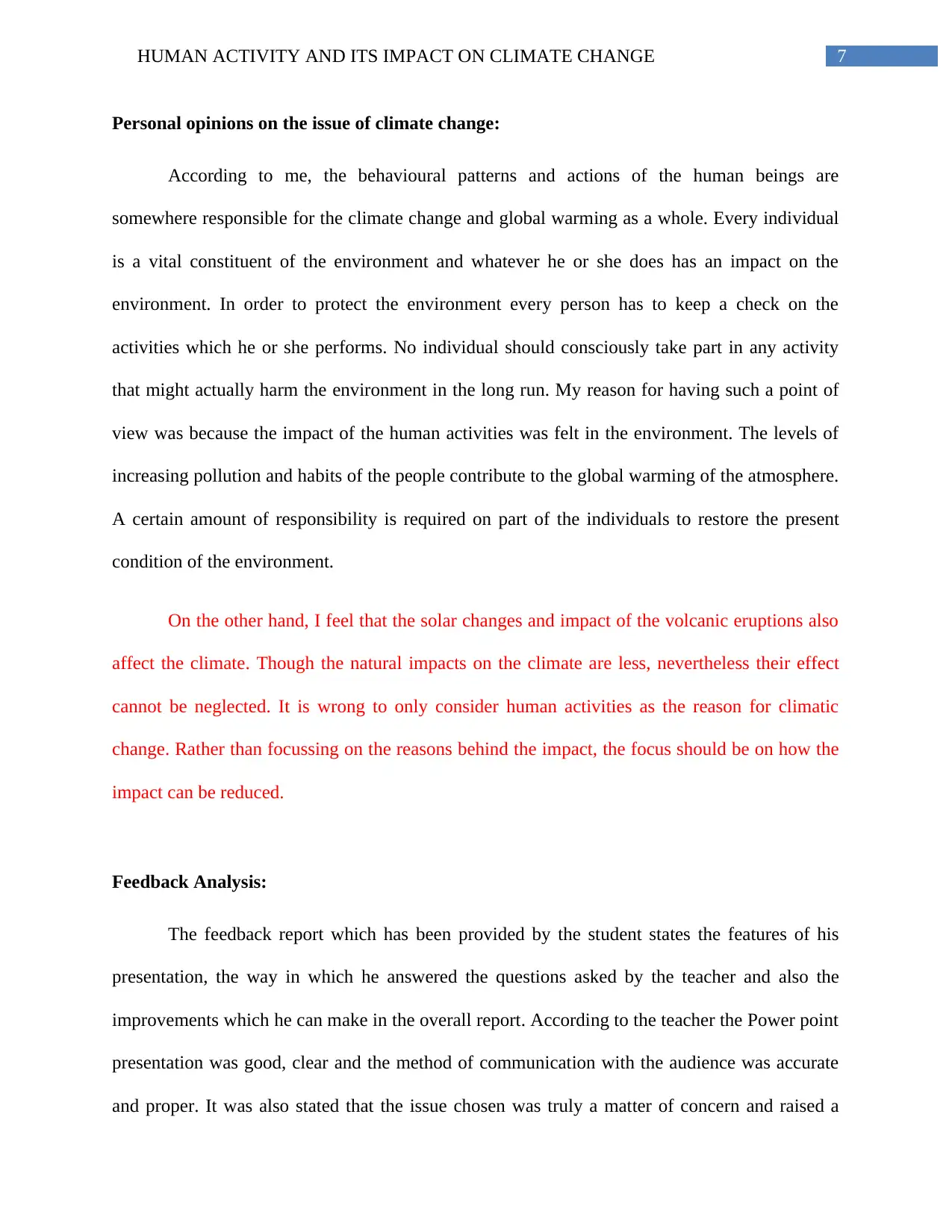
7HUMAN ACTIVITY AND ITS IMPACT ON CLIMATE CHANGE
Personal opinions on the issue of climate change:
According to me, the behavioural patterns and actions of the human beings are
somewhere responsible for the climate change and global warming as a whole. Every individual
is a vital constituent of the environment and whatever he or she does has an impact on the
environment. In order to protect the environment every person has to keep a check on the
activities which he or she performs. No individual should consciously take part in any activity
that might actually harm the environment in the long run. My reason for having such a point of
view was because the impact of the human activities was felt in the environment. The levels of
increasing pollution and habits of the people contribute to the global warming of the atmosphere.
A certain amount of responsibility is required on part of the individuals to restore the present
condition of the environment.
On the other hand, I feel that the solar changes and impact of the volcanic eruptions also
affect the climate. Though the natural impacts on the climate are less, nevertheless their effect
cannot be neglected. It is wrong to only consider human activities as the reason for climatic
change. Rather than focussing on the reasons behind the impact, the focus should be on how the
impact can be reduced.
Feedback Analysis:
The feedback report which has been provided by the student states the features of his
presentation, the way in which he answered the questions asked by the teacher and also the
improvements which he can make in the overall report. According to the teacher the Power point
presentation was good, clear and the method of communication with the audience was accurate
and proper. It was also stated that the issue chosen was truly a matter of concern and raised a
Personal opinions on the issue of climate change:
According to me, the behavioural patterns and actions of the human beings are
somewhere responsible for the climate change and global warming as a whole. Every individual
is a vital constituent of the environment and whatever he or she does has an impact on the
environment. In order to protect the environment every person has to keep a check on the
activities which he or she performs. No individual should consciously take part in any activity
that might actually harm the environment in the long run. My reason for having such a point of
view was because the impact of the human activities was felt in the environment. The levels of
increasing pollution and habits of the people contribute to the global warming of the atmosphere.
A certain amount of responsibility is required on part of the individuals to restore the present
condition of the environment.
On the other hand, I feel that the solar changes and impact of the volcanic eruptions also
affect the climate. Though the natural impacts on the climate are less, nevertheless their effect
cannot be neglected. It is wrong to only consider human activities as the reason for climatic
change. Rather than focussing on the reasons behind the impact, the focus should be on how the
impact can be reduced.
Feedback Analysis:
The feedback report which has been provided by the student states the features of his
presentation, the way in which he answered the questions asked by the teacher and also the
improvements which he can make in the overall report. According to the teacher the Power point
presentation was good, clear and the method of communication with the audience was accurate
and proper. It was also stated that the issue chosen was truly a matter of concern and raised a
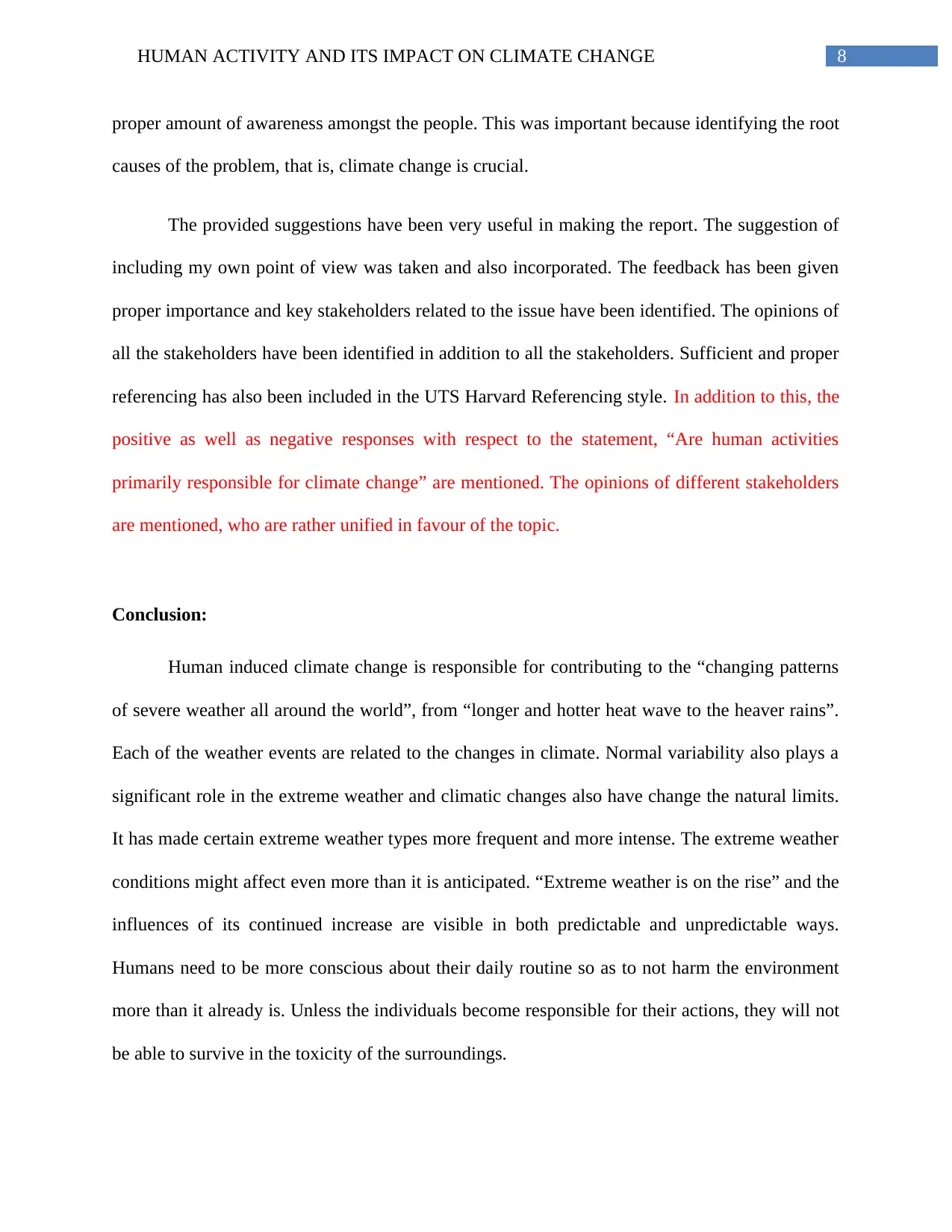
8HUMAN ACTIVITY AND ITS IMPACT ON CLIMATE CHANGE
proper amount of awareness amongst the people. This was important because identifying the root
causes of the problem, that is, climate change is crucial.
The provided suggestions have been very useful in making the report. The suggestion of
including my own point of view was taken and also incorporated. The feedback has been given
proper importance and key stakeholders related to the issue have been identified. The opinions of
all the stakeholders have been identified in addition to all the stakeholders. Sufficient and proper
referencing has also been included in the UTS Harvard Referencing style. In addition to this, the
positive as well as negative responses with respect to the statement, “Are human activities
primarily responsible for climate change” are mentioned. The opinions of different stakeholders
are mentioned, who are rather unified in favour of the topic.
Conclusion:
Human induced climate change is responsible for contributing to the “changing patterns
of severe weather all around the world”, from “longer and hotter heat wave to the heaver rains”.
Each of the weather events are related to the changes in climate. Normal variability also plays a
significant role in the extreme weather and climatic changes also have change the natural limits.
It has made certain extreme weather types more frequent and more intense. The extreme weather
conditions might affect even more than it is anticipated. “Extreme weather is on the rise” and the
influences of its continued increase are visible in both predictable and unpredictable ways.
Humans need to be more conscious about their daily routine so as to not harm the environment
more than it already is. Unless the individuals become responsible for their actions, they will not
be able to survive in the toxicity of the surroundings.
proper amount of awareness amongst the people. This was important because identifying the root
causes of the problem, that is, climate change is crucial.
The provided suggestions have been very useful in making the report. The suggestion of
including my own point of view was taken and also incorporated. The feedback has been given
proper importance and key stakeholders related to the issue have been identified. The opinions of
all the stakeholders have been identified in addition to all the stakeholders. Sufficient and proper
referencing has also been included in the UTS Harvard Referencing style. In addition to this, the
positive as well as negative responses with respect to the statement, “Are human activities
primarily responsible for climate change” are mentioned. The opinions of different stakeholders
are mentioned, who are rather unified in favour of the topic.
Conclusion:
Human induced climate change is responsible for contributing to the “changing patterns
of severe weather all around the world”, from “longer and hotter heat wave to the heaver rains”.
Each of the weather events are related to the changes in climate. Normal variability also plays a
significant role in the extreme weather and climatic changes also have change the natural limits.
It has made certain extreme weather types more frequent and more intense. The extreme weather
conditions might affect even more than it is anticipated. “Extreme weather is on the rise” and the
influences of its continued increase are visible in both predictable and unpredictable ways.
Humans need to be more conscious about their daily routine so as to not harm the environment
more than it already is. Unless the individuals become responsible for their actions, they will not
be able to survive in the toxicity of the surroundings.
⊘ This is a preview!⊘
Do you want full access?
Subscribe today to unlock all pages.

Trusted by 1+ million students worldwide
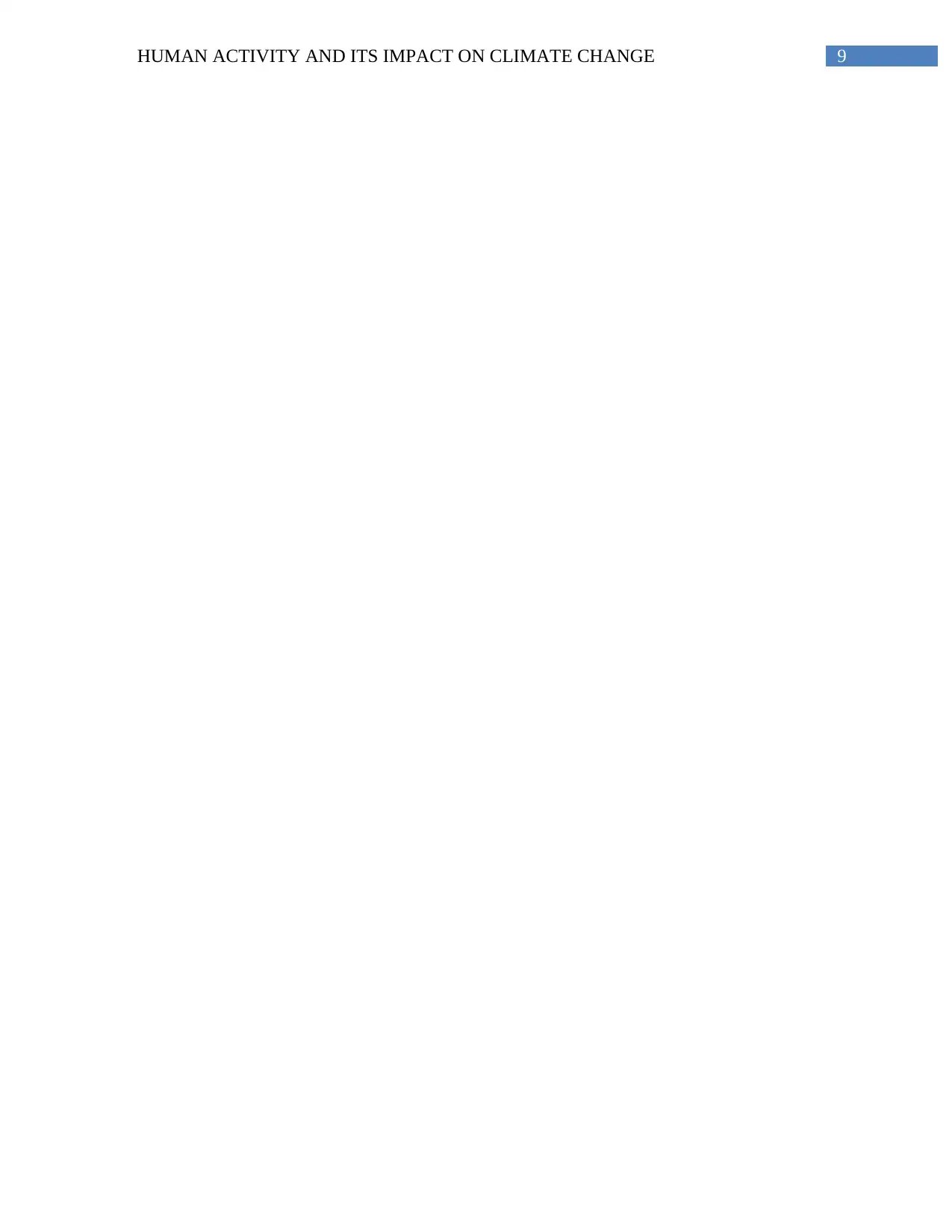
9HUMAN ACTIVITY AND ITS IMPACT ON CLIMATE CHANGE
Paraphrase This Document
Need a fresh take? Get an instant paraphrase of this document with our AI Paraphraser
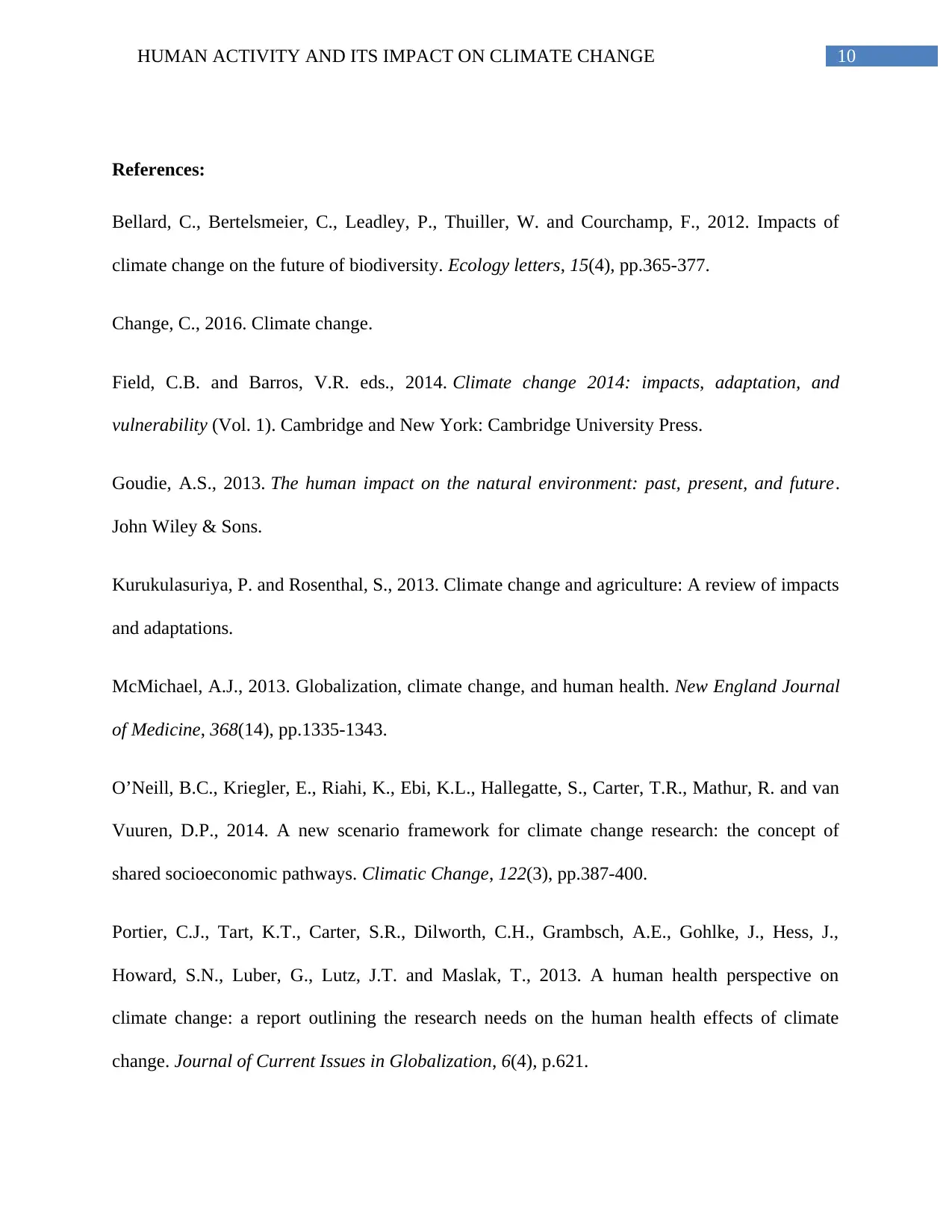
10HUMAN ACTIVITY AND ITS IMPACT ON CLIMATE CHANGE
References:
Bellard, C., Bertelsmeier, C., Leadley, P., Thuiller, W. and Courchamp, F., 2012. Impacts of
climate change on the future of biodiversity. Ecology letters, 15(4), pp.365-377.
Change, C., 2016. Climate change.
Field, C.B. and Barros, V.R. eds., 2014. Climate change 2014: impacts, adaptation, and
vulnerability (Vol. 1). Cambridge and New York: Cambridge University Press.
Goudie, A.S., 2013. The human impact on the natural environment: past, present, and future.
John Wiley & Sons.
Kurukulasuriya, P. and Rosenthal, S., 2013. Climate change and agriculture: A review of impacts
and adaptations.
McMichael, A.J., 2013. Globalization, climate change, and human health. New England Journal
of Medicine, 368(14), pp.1335-1343.
O’Neill, B.C., Kriegler, E., Riahi, K., Ebi, K.L., Hallegatte, S., Carter, T.R., Mathur, R. and van
Vuuren, D.P., 2014. A new scenario framework for climate change research: the concept of
shared socioeconomic pathways. Climatic Change, 122(3), pp.387-400.
Portier, C.J., Tart, K.T., Carter, S.R., Dilworth, C.H., Grambsch, A.E., Gohlke, J., Hess, J.,
Howard, S.N., Luber, G., Lutz, J.T. and Maslak, T., 2013. A human health perspective on
climate change: a report outlining the research needs on the human health effects of climate
change. Journal of Current Issues in Globalization, 6(4), p.621.
References:
Bellard, C., Bertelsmeier, C., Leadley, P., Thuiller, W. and Courchamp, F., 2012. Impacts of
climate change on the future of biodiversity. Ecology letters, 15(4), pp.365-377.
Change, C., 2016. Climate change.
Field, C.B. and Barros, V.R. eds., 2014. Climate change 2014: impacts, adaptation, and
vulnerability (Vol. 1). Cambridge and New York: Cambridge University Press.
Goudie, A.S., 2013. The human impact on the natural environment: past, present, and future.
John Wiley & Sons.
Kurukulasuriya, P. and Rosenthal, S., 2013. Climate change and agriculture: A review of impacts
and adaptations.
McMichael, A.J., 2013. Globalization, climate change, and human health. New England Journal
of Medicine, 368(14), pp.1335-1343.
O’Neill, B.C., Kriegler, E., Riahi, K., Ebi, K.L., Hallegatte, S., Carter, T.R., Mathur, R. and van
Vuuren, D.P., 2014. A new scenario framework for climate change research: the concept of
shared socioeconomic pathways. Climatic Change, 122(3), pp.387-400.
Portier, C.J., Tart, K.T., Carter, S.R., Dilworth, C.H., Grambsch, A.E., Gohlke, J., Hess, J.,
Howard, S.N., Luber, G., Lutz, J.T. and Maslak, T., 2013. A human health perspective on
climate change: a report outlining the research needs on the human health effects of climate
change. Journal of Current Issues in Globalization, 6(4), p.621.
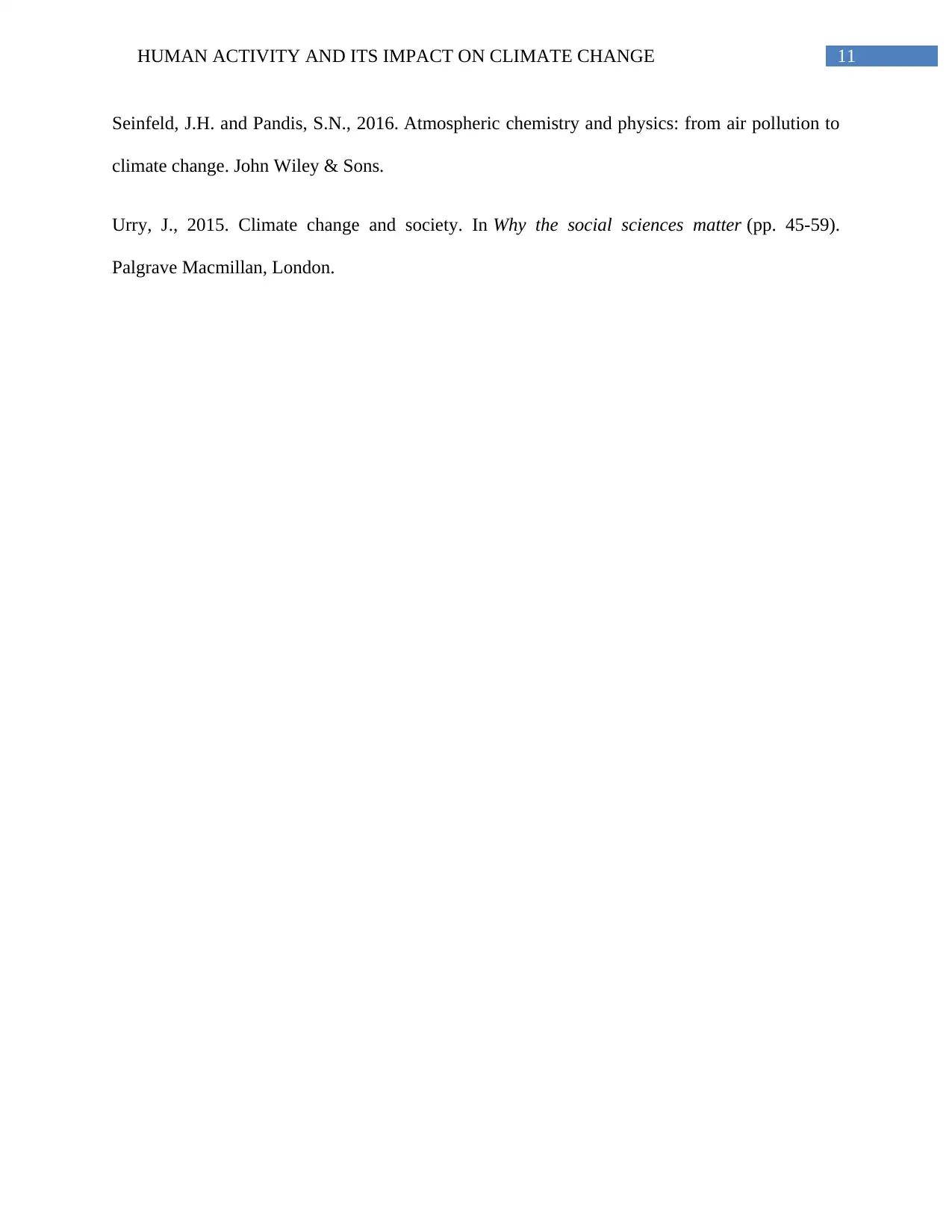
11HUMAN ACTIVITY AND ITS IMPACT ON CLIMATE CHANGE
Seinfeld, J.H. and Pandis, S.N., 2016. Atmospheric chemistry and physics: from air pollution to
climate change. John Wiley & Sons.
Urry, J., 2015. Climate change and society. In Why the social sciences matter (pp. 45-59).
Palgrave Macmillan, London.
Seinfeld, J.H. and Pandis, S.N., 2016. Atmospheric chemistry and physics: from air pollution to
climate change. John Wiley & Sons.
Urry, J., 2015. Climate change and society. In Why the social sciences matter (pp. 45-59).
Palgrave Macmillan, London.
⊘ This is a preview!⊘
Do you want full access?
Subscribe today to unlock all pages.

Trusted by 1+ million students worldwide
1 out of 12
Related Documents
Your All-in-One AI-Powered Toolkit for Academic Success.
+13062052269
info@desklib.com
Available 24*7 on WhatsApp / Email
![[object Object]](/_next/static/media/star-bottom.7253800d.svg)
Unlock your academic potential
Copyright © 2020–2026 A2Z Services. All Rights Reserved. Developed and managed by ZUCOL.





